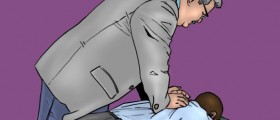
The History of Humor Therapy
Martin Luther used humor therapy for treating depressed people, advising them not to isolate themselves from the rest of the world, but, rather to socialize and remain positive.
Nevertheless, what we now consider modern humor therapy dates from 1930s. Back then clowns were brought to hospitals so that they could cheer up children who were suffering from polio. Also, in 1979 a man named Norman Cousins wrote a book “Anatomy of an Illness” describing how he used laughter for treating spine problems and arthritis in his patients, since laughter and humor exposure decreased pain people suffering from these diseases felt.
Positive Effects of Humor Therapy
Even though laughter and medicine may not seem to be an obvious pair, humor is very helpful in treating various diseases and other health problems. Laughter improves our mental, physical, emotional and spiritual health, helping us relax and deal with problems better. Moreover, laughter relieves our liver of pressure by removing tension from our diaphragm. Additionally, it makes our stress go away, boosts our immune system and generally improves our outlook on life, making us enjoy our existence more.
One fact is for sure, whenever we are feeling sick, tired or unable to muster enough strength to get out of bed, laughter can help us get out of this situation and regain our life energy.
More on Humor Therapy
Modern humor therapy seems to work best on the elderly and children, even though adults can benefit from it too. Laughter implemented in hospitals or other medical facilities can be very helpful in motivating patients towards recovery and making them feel better.
Basically, nothing but good, tasty jokes is necessary for humor therapy to be effective. However, you need to be careful, since there are people who do not appreciate humor that much and may get offended by it, making the whole matter worse. Thus, do a bit of research before exposing an individual to humor therapy.
If a person is not open to humor therapy, it may trigger negative effects, leading to depression, sadness and alienation, as well as other unwanted results.
Regardless of the effectiveness and the positive characteristics of this sort of treatment, humor therapy is still not widely accepted in medicine. Thus, we have medical facilities which support this therapeutic approach and those who do not. Either way, know that humor hold great therapeutic promise and stay positive, exposing yourself to situations which make you laugh as often as possible. For all we know, this could treat your health problems completely.
- www.cdc.gov/healthcommunication/pdf/audience/audienceinsight_culturalinsights.pdf
- www.betterhealth.vic.gov.au/health/conditionsandtreatments/eye-floaters
- Photo courtesy of Mateus Lunardi Dutra by Flickr: www.flickr.com/photos/mateusd/14211748699/

















Your thoughts on this
Loading...